Is Your Dog Barking While Camping? 6 Simple Solutions
If you have a talkative dog, then you know that they can quickly turn a great camping trip into a highly stressful situation.
But your vocal dog may be frustrating to more than just you and your family. It can be disruptive to everyone else in the campground. If you notice your dog barking while camping, it’s your job to address the situation quickly and effectively.
Now, I’m sure there are many of you thinking, “sure, that’s easier said than done!” It’s true, dogs don’t exactly come with a remote control where you can just hit ‘mute’ when the situation warrants it.
I get it, I do! Our three dogs were far from little angels when they were each first introduced to the camping lifestyle.
While there is no instant quick fix, there are steps that you can take to address your dog’s behaviours and train them to be a better travel companion.
Ready to make a change and set yourself up for success on your next trip camping with your dog? Let’s dig deeper into why dogs bark at the campsite and what you can do to stop it.
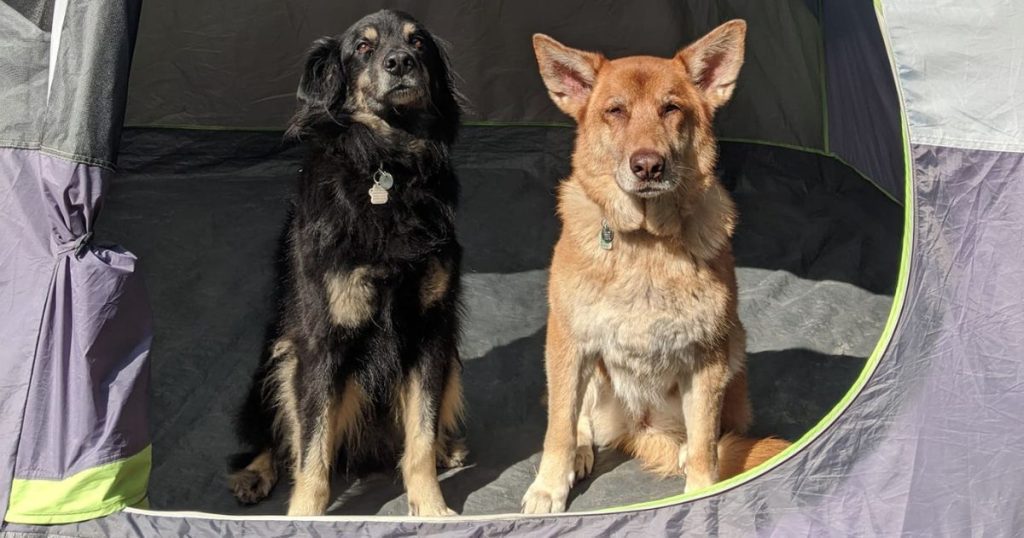
This post contains affiliate links, which means if you click and buy, we will make a commission (at no cost to you). See my full disclosure policy for more details.
Why Do Dogs Bark While Camping?
The first step to addressing your dog’s vocal behaviours is understanding why they are barking. Dogs don’t bark just to hear their own voices – there is an underlying reason for their actions.
To change the behaviour, you need to address the cause.
Excitement and Stimulation at Camp
Does your dog bark like crazy when you first arrive at the campsite, but the barking stops as you get settled? If so, your dog is likely responding to the initial excitement of arriving somewhere new.
It’s like the child that becomes hyperactive with excitement on your first day of vacation.
Excitement barking isn’t limited to new campsites either. Returning to a campsite you visit every year like we do Six Mile Lake Provincial Park causes excitement. If it didn’t, would we eagerly return year after year? Why should it be different for them?
Excitable dogs aren’t barking at anything, they are just communicating their feelings to you.
Barking from Boredom
Is it possible that your dog is simply bored? If your attention is on other things, such as setting up camp or cooking your meal, your dog may try to convince you to play.
Boredom barking may be paired with a play bow. This is where a dog lays down on their front legs with their back legs still standing and their bottom in the air. This stance is an invitation to come and play with them.
Anxiety or Stress from Camping
You may be wondering, is camping stressful for dogs? The shorter answer is yes and no. The level of stress or anxiety your dog may experience will depend on many different factors, including:
- Their usual stress or anxiety levels
- The number of people or other pets in the area (including other campsites, on the water if you have a waterfront site, or walking past on the road)
- New sounds that your dog may find concerning
- Anxiety triggers like a thunderstorm rolling in
- How much pent-up energy your dog has, after all, a tired dog is a happy dog
A dog often stressed out by new experiences will struggle with this far more than a dog that is laid back in new environments. So, this comes down to really knowing your dog and their triggers.
Many anxiety triggers can’t be completely eliminated, despite your best efforts. But you can help to ease your dog’s anxiety and reduce triggers wherever possible.
Note: Some dogs experience extreme anxiety and stress when camping or travelling. If this is your dog, you need to be completely honest with yourself as to whether bringing your dog along on your outdoor adventures is really in their best interest. Some dogs simply aren’t outdoor travellers, and that’s okay!
Barking for a Medical Reason
There are also reasons that your dog’s health or well-being could lead to barking. If your dog starts barking after a long hike or a rough play session with another dog, it’s possible that they may be trying to communicate that they are in pain.
Pain barking is your dog’s way of letting their “pack” (that’s you) know that there is something wrong and they need your help.
If your dog is a senior, it may also be a sign of cognitive disfunction. Just like humans, dogs will experience cognitive changes with age. You may notice your dog suddenly barking at nothing when they weren’t previously a big barker. This could simply be confusion.
Camping with a Reactive Dog
There is a lot of misinformation out there regarding reactivity in dogs. A reactive dog is not an aggressive dog. They are merely a dog that is reacting to something in their environment.
Most reactive dogs are acting out of fear. While they bark, growl or lunge in response to encountering a trigger, they aren’t actively trying to pick a fight or attack someone. If you have a dog barking at people each time they see them, they may have a fear of strangers.
Reactivity can be the result of poor socialization, lack of training, a traumatic experience, or your dog’s genetics.
Unfortunately, your dog isn’t going to grow out of reactivity. It’s not something that will just naturally go away on its own. But it can be managed and addressed to help ease the fear and reduce the reactive response to their trigger.
There is a lot of judgment when it comes to reactive dogs, and that’s something that we, as a society, need to put an end to!
Many owners of reactive dogs are genuinely trying their best and working through their dog’s challenges, but it takes time. There is no magic wand that can solve reactivity overnight. We know! Our youngest dog Lucifer is reactive to strangers because of the trauma he faced before being rescued.
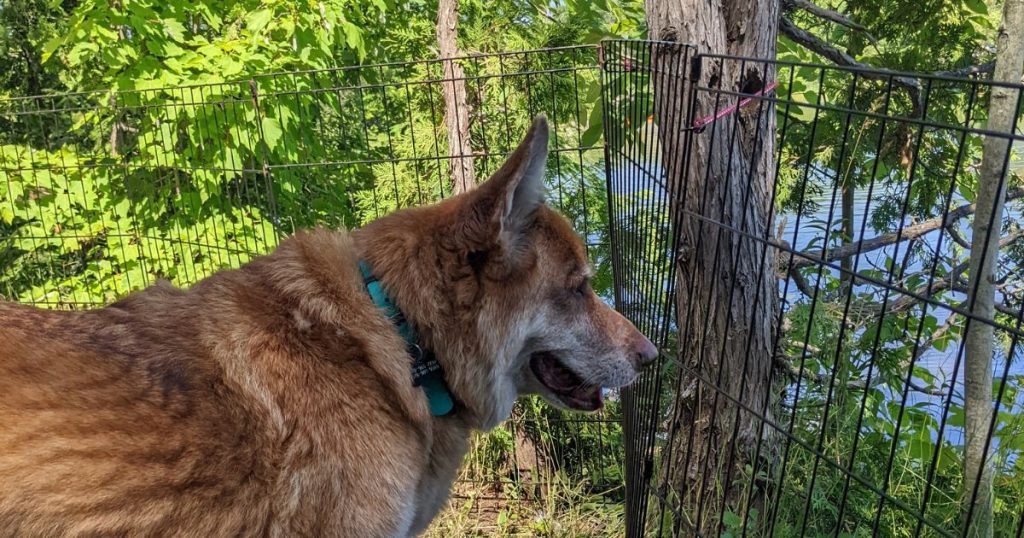
How Do I Get My Dog to Stop Barking When Camping?
Now that you have identified the reason for your dog barking while camping, it’s time to look at finding a solution.
For dog owners that are wondering how to stop dog barking when camping, there is no one magic fix that will solve all the problems listed above. Instead, there are several possible ways you can approach the situation.
Depending on your dog and the reason for their barking, you may need to try a few different solutions before you find one that works. You may also need to use a combination of more than one of these options to manage the situation fully.
Minimize Stimulation When You First Arrive
If you have an excitement barker, the best thing you can do is try to tone down the energy and excitement when you are first arriving at your campsite.
Talk in calm voices and avoid encouraging extra excitement. If you’re that person who usually exclaims, “We’re here!” as you pull up to the campsite, you’re contributing to the problem. Instead, arrive calmly and don’t make a big deal out of it.
Try to set your dog up somewhere where they are exposed to as little stimulation as possible while you set up your campsite.
We quickly realized that our boy Indiana was an excitement barker. He barks when we reach for the treat bag, before we open the back door to let him out at home, and the moment we pull up to the campsite.
After calming him down, we set the tent up first. This allows us to put him in the tent while we finish setting up, a space that he has been trained is a quiet and relaxed space.
When we have finished setting up and are ready to kick back ourselves, we can bring him out onto the campsite with a calm and peaceful energy that helps control his excitement.
Limit View of the Action Around You
If your dog is reactive to other dogs walking along the road in front of your campsite, try to set up your site so that they can’t see this foot traffic. The same goes for blocking their view into neighbouring campsites.
With a reactive dog in our pack, this is a point that we often need to consider. It’s also important for those who are camping with an anxious dog.
If we are setting up for camp in a busier area of the park, we will often put a tarp along one side of the exercise pen that we use to contain our dogs to block the visual of people and other dogs walking past.
You can also use your tent, trailer, or vehicle to block areas where they may be able to see a trigger.
Offer Mental and Physical Stimulation
We often talk about the importance of mental stimulation for dogs at home, but don’t forget to carry that over to your days at the campsite.
Physical exercise while camping comes easy. This includes hiking, long walks, swimming, or even digging, if that’s something your dog enjoys (but be sure to fill any holes in properly before leaving your site at the end of your trip).
But mental stimulation can wear your dog out more than exercise. In fact, proper mental stimulation is the key to addressing boredom barking.
When packing, include a food puzzle toy or a snuffle mat with your gear for some fun entertainment. These are a great way to turn your dog’s regular meals into an enrichment opportunity. Add their food to the puzzle and watch as they work through how to get to it.
Consider Calming Solutions for Anxiety
If your dog is barking due to stress and anxiety, you may be able to quiet the barking by introducing a calming solution.
Calming treats and supplements are made with natural ingredients that help to induce a state of calm and relaxation. They may work by producing a sedative effect, leaving your dog feeling drowsy, or triggering the production of the body’s “feel-good” hormones like dopamine and serotonin.
Another calming solution that many dog owners have found to be effective for addressing dog anxiety while camping is the Thundershirt. This is a shirt that is put on your dog that applies pressure to the torso. The pressure triggers the release of a calming hormone.
Offer Your Dog a Distraction
One easy way to put an end to your dog barking while camping is to give them something more exciting to focus their attention on.
If you have a dog that is food driven, a tasty chew or an enrichment toy stuffed with something tasty can take their attention away from foot traffic, other campers, or the local wildlife. Play-driven dogs may be happy to ignore their surroundings in exchange for a game of fetch with their people.
The key here is to find what your dog loves most and use it as a positive distraction from the triggers around them.
Reward Good Behaviour
We are strong advocates for the power of positive reinforcement training with dogs. This extends beyond just teaching the standard obedience commands like “sit” and “stay.”
Most dogs are eager to please their owners to some degree (with some dog breeds taking it to the extreme). If you reward your dog and show them that good things come when they respond to a situation in a certain way, they are more likely to repeat that action in the future.
For example, if your dog normally barks when people walk past, and you notice that they watch but don’t respond to a person passing your campsite, reward them!
Rewards can come in many forms. This includes verbal praise, pets and scratches in their favourite spots, treats, or even playtime. The goal is to find something that is high value enough in your dog’s eyes to encourage them to continue this behaviour in the future.
Take a moment to consider what matters most to your dog. This will differ from dog to dog. We have 3 dogs in our pack, and every dog is motivated by something different.
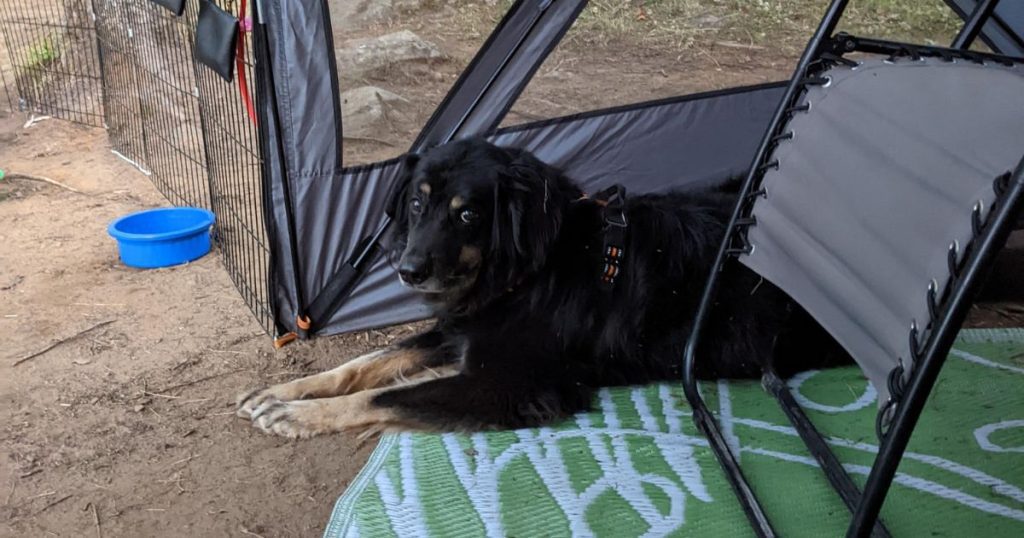
Can Dogs be Trained Not to Bark?
Yes, some steps can be taken to train your dog not to bark. This starts with identifying the trigger or cause for your dog’s barking, then retraining the way they react to that trigger in the future.
Known as “behavioural medication,” this process involves slowly exposing your dog to their trigger at a distance. If they respond negatively, move back further and try again. When your dog responds the way you want, ignoring the trigger or choosing not to react, reward them.
Slowly move closer with each training session. Continue rewarding them when they ignore the trigger or respond to it in a positive way (like watching but not barking).
If your dog barks once or twice, ignore them. If you find that they are getting highly reactive to the trigger, take a step back and move further away for your next training session. This is a sign that you may have moved too quickly.
Avoid any aversive techniques like scolding your dog, jerking the leash, or using an “anti-bark collar” for this training.
These “training” techniques may appear to deliver a quick response. But the fact that they appear to work now doesn’t tell the whole story. Studies have shown that aversive training techniques can lead to long-term problems.
How Can I Calm My Dog Down in a Tent?
I previously mentioned that our dogs view the tent as a calm space, enough so that we can leave them in the tent alone while we finish setting up our campsite. But how do you get a dog to that point?
To begin with, you need to set some ground rules. While our dogs enjoy snuggling with us or playing peacefully with one of their own toys while we sleep, they aren’t allowed to play together. Physical play like that which dogs enjoy together is reserved for when they are outdoors.
Each of our dogs has been given “their space.” This includes a bed that the other dogs aren’t allowed to bug them when they are on, their favourite toy(s) and access to fresh water throughout the night.
Where that bad is differs depending on the dog. Daviana, our oldest, prefers to sleep on her own. So, she has a cot-style bed with a blanket on it that is solely for her. On the other hand, our youngest sleeps curled under the blankets in our bed every night (even at home). His “space” is a special blanket placed on our bed.
In the beginning, we would praise and reward the dogs any time that they relaxed on their bed. We also reinforced this idea by using those same blankets to train the “place” command at home.
If the dogs do become overactive in the tent, they are brought outside to an enclosed pen where they can play. This can be frustrating at first, as you just want to relax in your tent. But sticking to enforcing the rules in the beginning has given us many years of tent camping enjoyably with our pups.
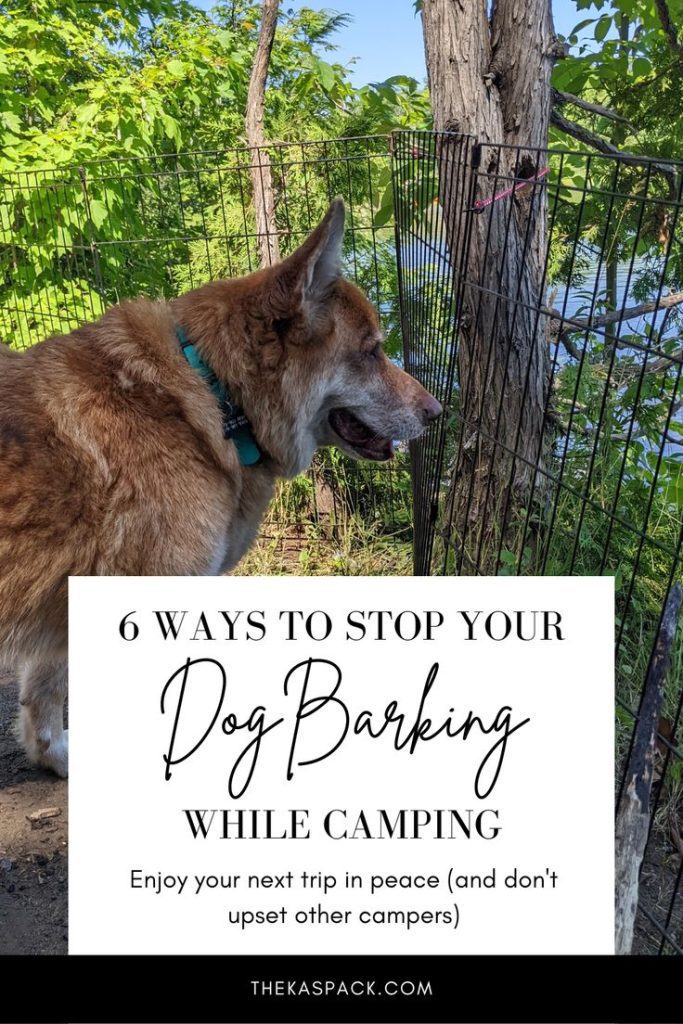
Have you ever struggled with a dog barking while camping? If so, what did you do to address the situation?
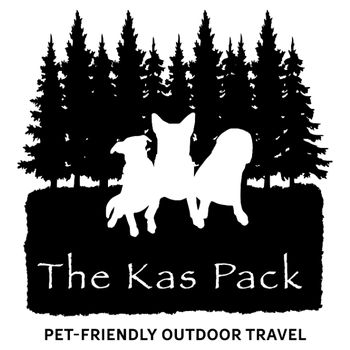
thx for sharing your camping wisdom with some of us newbies. there is a lot you have shared that can apply to travel with dogs whether in staying with family, friends, in hotels/motels or camping. for instance, we’re leaving on spring break in a few days and i often forget to pack indoor ball or toys. i am better at bringing their Yak bones or other pacifiers such as adaptil diffuser but those likely won’t work as well within a camper.
i have been exploring solo camping with my senior and younger dog but both are reactive to other dogs and noises. they are guard dogs by breed so i worry that they’re going to be on high alert until we settle in. neither can be off leash outdoors b/c of this and even if inside the penn, they need leads to prevent charging and escape. they are well behaved dogs in the house but the younger is still learning leash manners while the senior only reacts to dogs. with all that in mind, i have tried to also determine the most well insulated camper option for us and much as i’d like the ease of a pop up, don’t think other campers would appreciate how barky it would inevitably cause each to be. we just had a scratching noise in the ceiling (mice or birds) and they and the cat were on high alert. so i have explored hard sided pop ups but doubt they provide any more insulation. can’t so much afford a drivable camper unless we rent it. so any ideas on that front are welcome.
It sounds like you are putting a lot of careful consideration into what’s best for them. One suggestion I have is to try bringing along a radio that you can play quietly in the camper. If your dogs are triggered by the sound of dogs around them, this can help to keep their minds off any outside sounds – which may help when using a camper that isn’t as well insulated.